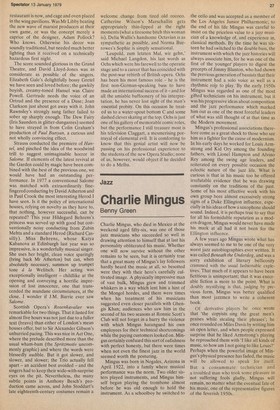Charlie Mingus
Benny Green
Charlie Mingus, who died in Mexico at the weekend aged fifty-six, was one of those jazz musicians who succeeded so well in drawing attention to himself that at last his personality obliterated his music. Whether one will now survive without the other remains to be seen, but it is certainly true that a great many of Mingus's lay followers hardly heard the music at all, so besotted were they with their hero's carefully cultivated image. A physically impressive man of vast bulk, Mingus grew and trimmed whiskers in a way which lent him a hint of the Mongol hordes, and there were times when his treatment of his musicians suggested even closer parallels with Ghengis Khan; audiences who saw him in the second of his two seasons at Ronnie Scott's Club will not forget in a hurry the violence with which Mingus harangued his own employees for their technical shortcomings while the paying customers looked on. Mingus certainly confused this sort-of oafishness with perfect honesty, but there were times when not even the finest jazz in the world seemed worth the posturing.
Mingus was born in Nogales, Arizona in April 1922, into a family where musical performance was the norm. Two older sisters played instruments, and Mingus himself began playing the trombone almost before he was old enough to hold the instrument. As a schoolboy he switched to the cello and was accepted as a member of the Los Angeles Junior Philharmonic; to the end of his life Mingus was careful to insist on the priceless value to a jazz musician of a knowledge of, and experience in, classical methods. By the time he was sixteen he had switched to the double bass, the instrument with which the jazz histories will always associate him, for he was one of the first of the younger players to digest the precepts of Jimmy Blanton, who had shown the previous generation of bassists that their instrument had a solo voice as well as a rhythmic rote to play.'By the early 1950s Mingus was regarded as one of the most gifted technicians on his instrument, but it was his progressive ideas about composition and the jazz performance which marked him out as one of the most forceful leaders of what was still thought of at that time as the Modern movement.
Mingus's professional associations therefore come as a great shock to those who see him as a fighter for the cause of modernism. In his early days he worked for Louis Armstrong and Kid Ory among the founding fathers, with Lionel Hampton and Alvino Rey among the swing age leaders, and reiterated on every possible occasion the eclectic nature of the jazz life. What is curious is that in his music too he offered irrefutable evidence that he was drawing constantly on the traditions of the past. Some of his most effective work with his own group bore almost excessively strong signs of a Duke Ellington influence, especially in his ideas of how a saxophone should sound. Indeed, it is perhaps true to say that for all his formidable reputation as a modern dragon, Mingus would never have made his mark at all had it not been for the Ellington influence.
A few years ago Mingus wrotewhat has always seemed to me to be one of the very worst jazz autobiographies ever written. It was called Beneath the Underdog, and was a sorry exhibition of literary bellicosity crammed with the usual fashionable expletives. That much of it appears to have been fictitious is unimportant; that it was execrable fiction is more to the point. What is doubly mystifying is that, judging by previous form, Mingus was better qualified than most jazzmen to write a coherent book.
Of derivative players he once wrote that 'the copyists sing the great men's praises while stealing their phrases'; he once rounded on Miles Davis by writing him an open letter, and when people expressed surprise that he liked Armstrong's playing he reproached them with 'I like all kinds of music, so how am I not going to like Louis?' Perhaps when the powerful image of Mingus's physical presence has faded, the music will be allowed to speak for itself. But a consummate technician and a troubled man who took some pleasure in not suffering fools gladly, Mingus will remain, no matter what the eventual fate of his music, one of the representative figures of the feverish 1950s.


































 Previous page
Previous page